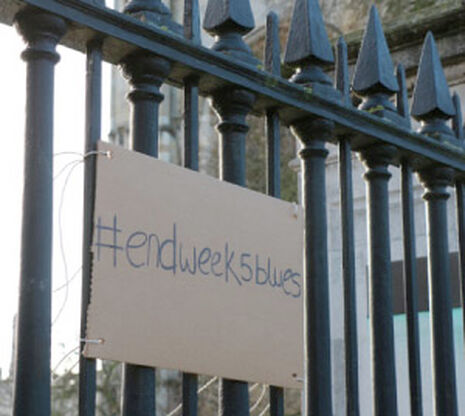Action for #endweek5blues campaign gets underway
CDE’s programme of events begins as the campaign gains momentum

Cambridge Defend Education’s week of events to mark its #endweek5blues campaign was launched this Thursday.The campaign, which advocates introducing nine week terms with a reading week in week five, aims to highlight mental health issues that arise from mid-term stress with a series of events including a rally on 18 February, the launch of a CUSU mandated petition and the publication of a CDE zine.
The campaign has posted a series of messages on its Facebook page as students begin their protests.
“You are legally entitled to engage in protest and CUSU Council has voted that CUSU should act to protect students engaging in strike action,” one reads. “As a student union, your JCR or MCR, along with CUSU, have a legal duty to protect students from victimisation for taking part in political protest.”
CDE has also published a draft email for students who wish to bring their support for the campaign to their supervisors’ attention to use.
The open meeting, which took place at the University Centre last Tuesday, also focussed on the aims and direction of the campaign. Although all present were in favour of pushing for the implementation of a reading week, it was stressed that those attending wanted to make the student body aware of the apparent structural oppression that students at the university are subjected to.
One issue specifically discussed was the need to distance the initiative from the idea that students merely want an additional holiday. The campaign also aims to discredit the notion that the immense pressure of a Cambridge degree is an essential part of the experience of studying in Cambridge.
In a Varsity survey, 53 per cent of students were in favour of a change in term length. However, 53 per cent said they were either unsure or did not know whether CDE’s overall impact in Cambridge had been positive or negative, while 14 per cent thought it was negative.
The campaign has also been backed by a vote in CUSU Council.
Speaking at the first Council meeting of Lent term, CUSU President Helen Hoogewerf-McComb argued that a reading week would increase the quality of work submitted and would halt the University from “rewarding the ability to work without sleep”.
On Tuesday morning, CDE began publicising “solidarity squares”, blue felt badges that allow the wearer to make clear their support for the campaign.
The measures planned by CDE echo university-wide calls for an end to the apparent institutionalised pressure exerted on the students of Cambridge.
Daisy Hughes, CUSU Women and Class Campaign Manager and founding member of Whose University?, expressed her views on the #endweekfiveblues initiative in an article for the Huffington Post.
“I’d rather that my university didn’t discriminate in this way against vulnerable members of its student body,” she wrote.
“I think that we can keep the academic rigour for which Cambridge is famous while adapting the system so it doesn’t break the people in it.”
 Comment / Plastic pubs: the problem with Cambridge alehouses 5 January 2026
Comment / Plastic pubs: the problem with Cambridge alehouses 5 January 2026 News / Cambridge academics stand out in King’s 2026 Honours List2 January 2026
News / Cambridge academics stand out in King’s 2026 Honours List2 January 2026 News / Cambridge businesses concerned infrastructure delays will hurt growth5 January 2026
News / Cambridge businesses concerned infrastructure delays will hurt growth5 January 2026 News / AstraZeneca sues for £32 million over faulty construction at Cambridge Campus31 December 2025
News / AstraZeneca sues for £32 million over faulty construction at Cambridge Campus31 December 2025 Interviews / You don’t need to peak at Cambridge, says Robin Harding31 December 2025
Interviews / You don’t need to peak at Cambridge, says Robin Harding31 December 2025








